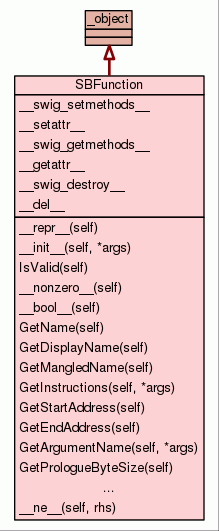|
|
|
|
|
__init__(self,
*args)
__init__(lldb::SBFunction self) -> SBFunction
__init__(lldb::SBFunction self, SBFunction rhs) -> SBFunction |
source code
|
|
|
|
IsValid(self)
IsValid(SBFunction self) -> bool |
source code
|
|
|
|
|
|
|
|
|
|
GetName(self)
GetName(SBFunction self) -> char const * |
source code
|
|
|
|
GetDisplayName(self)
GetDisplayName(SBFunction self) -> char const * |
source code
|
|
|
|
GetMangledName(self)
GetMangledName(SBFunction self) -> char const * |
source code
|
|
|
|
GetInstructions(self,
*args)
GetInstructions(SBFunction self, SBTarget target) ->
SBInstructionList GetInstructions(SBFunction self, SBTarget target,
char const * flavor) -> SBInstructionList |
source code
|
|
|
|
GetStartAddress(self)
GetStartAddress(SBFunction self) -> SBAddress |
source code
|
|
|
|
GetEndAddress(self)
GetEndAddress(SBFunction self) -> SBAddress |
source code
|
|
|
|
GetArgumentName(self,
*args)
GetArgumentName(SBFunction self, uint32_t arg_idx) -> char const * |
source code
|
|
|
|
GetPrologueByteSize(self)
GetPrologueByteSize(SBFunction self) -> uint32_t |
source code
|
|
|
|
GetType(self)
GetType(SBFunction self) -> SBType |
source code
|
|
|
|
GetBlock(self)
GetBlock(SBFunction self) -> SBBlock |
source code
|
|
|
|
GetLanguage(self)
GetLanguage(SBFunction self) -> lldb::LanguageType |
source code
|
|
|
|
|
|
|
GetDescription(self,
*args)
GetDescription(SBFunction self, SBStream description) -> bool |
source code
|
|
|
|
|
|
|
__str__(self)
__str__(SBFunction self) -> PyObject * |
source code
|
|
|
|
|
|
|
|

